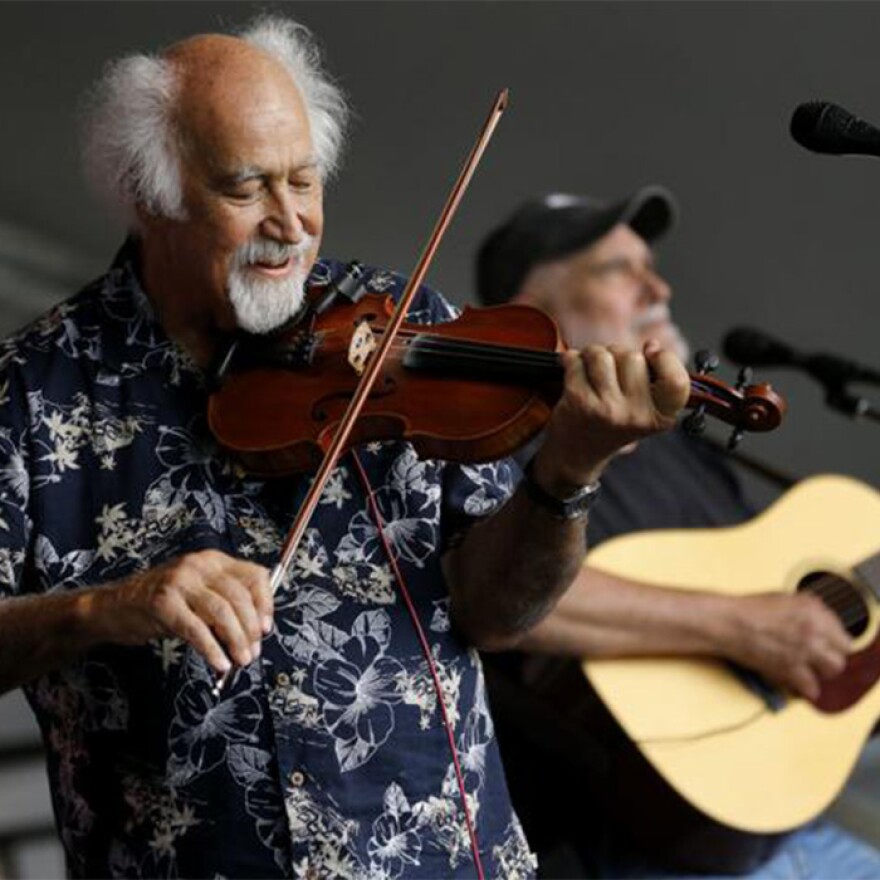This is American Routes, Down by the Riverside, live at the New Orleans Jazz Market. Our guests this hour are the Doucet brothers. Fiddler Michael is a National Heritage Fellow, a person who years ago did fieldwork with the elder Cajun musicians. Brother David on guitar adds high-speed virtuoso flatpicking. You may know them as founding members of the band Beausoleil.
Nick Spitzer: Alright, les Frere Doucet. So tell us a little how you got into Cajun music. I mentioned that you studied with a lot of the elders but what leads somebody who is a kid and growing up and going through school to want to do Cajun music?
Michael Doucet: Well, it’s of course what your parents don’t want you to do. I had an uncle, and he was a gambler. He was a musician, and he owned a racetrack called the China Ball Racetrack, which is a quarter horse racetrack straight down right by the house. And of course he played violin. And that’s what I wanted to play. So he taught me three songs: “Allons à Lafayette,” “Jolie Blonde,” and “St. Louis Blues.” Now I thought “St. Louis Blues” was a Cajun song. His violin is hanging in the Louisiana State Museum in Baton Rouge right next to Clifton Chenier’s accordions, so I’m pretty proud of that. What really prompted me was when I was at LSU and taking this easy course called Traditional Folk Music or something. So we studied blues. We studied Child Ballads. We studied Texas music and Native American music, nothing about French music.
NS: at LSU?
MD: This is Baton Rouge so of course I raised my hand and said, “What about our French music?” “Oh, that’s just translated American songs.” I said, “Oh, really?” So directly from the Music Department I went to the Archives. And found incredible stuff by Miss Irene Whitfield, her 1939 thesis on Acadian and Creole songs, and also the work of Harry Oster, Dr. Harry Oster, which was amazing. And then I also discovered that some of the people who first recorded this music in Southwest Louisiana 1929 to 1936 were still alive. One of those individuals was Dennis McGee, who, he played like no one I had ever heard. It was closer to music in France than it was to what we were hearing in Louisiana at that time, bar room music. So I became enamored with that, studied that and brought him out and sort of the rest is history.
NS: Yeah, you did the fieldwork. Give Michael a round for all of those labors. He keeps laboring, you all work together. David, you know, when I first heard Cajun music, I didn’t think of people playing French leads and flatpicking and doing all the virtuosic things you do. How did you get into the way you play the guitar with Cajun music?
David Doucet: I came in late, because I’m six years younger than Michael. There was roots music when I was in high school. “Will the Circle Be Unbroken” had just come out so there was all this interest. Doc Watson was my hero, and after learning several dozen of these songs I realized that you could play an acoustic guitar lead, but there was no acoustic guitar or very few acoustic guitar players because it was mainly bar room music. So you played through amps and stuff like that, which doesn’t really work with acoustic guitar, so I just developed a style that with the rhythm you would just add a lead. It’s a challenge. You think of the instrument that you are trying to copy, and lots of times I think of steel guitar, the pedal steel, which was very popular in Cajun music. And a lot of the licks that I play come from listening to those things.
NS: Now I wanted to ask you both, you know we’re here with folks concerned about the Mississippi River and the environment. What’s your sense of the health of the environment in Louisiana, I mean, you’ve sung two songs about hurricanes, how about Lafayette? It’s had a few floods over your lifetime.
MD: Yeah, Lafayette, yeah we’re almost coastal. We’re 35 miles from the coast.
NS: It didn’t used to be that close!
MD: No! But there’s a little town called Delcombe, and during Hurricane Rita, or as the late Mac Rebennack called it, he called it “Co-Rita,” after that hit–this town has never flooded. It’s about 15 miles from Lafayette. And it flooded. It went over the railroad track, and it flooded everything over there, which is very unusual. And I think it’s just a signpost of things to come.
NS: Well on a happier note I want to point out that I guess by the 1880s, the accordion became part of Cajun music and I noticed that Chad Huval, you’ve got an accordion there. Is that a German accordion of yours?
Chad Huval: The accordion originally is a German instrument. This one is handmade by a fellow from Lafayette. The better ones are made in Louisiana right now.
NS: I will add no comment to that. Let’s make them welcome one more time, the Doucet Brothers and Chad Huval on American Routes, Down By the Riverside.
To hear the full program, tune in Saturdays at 5 and Sundays at 6 on WWNO, or listen at americanroutes.org.



